The Communist Party of China (CPC) staged a massive parade Tuesday to celebrate the 70th anniversary of the founding of communist China.
While the nominal reason for the festivities was to celebrate the ideology of communism, the parade was first and foremost a celebration of dictator Xi Jinping, the head of the CPC and commander-in-chief of the People’s Liberation Army (PLA), who holds at least ten other titles.
Xi entered Tiananmen Square in a car alone to “inspect” the hundreds of troops rallied to march into the heart of Beijing and the advanced weaponry the CPC chose to display, including a new intercontinental ballistic missile. In addition to a large screen airing live footage of Xi over the crowd, the regime showcased several murals of Xi and at least one parade float featuring a giant image of his face, in one case simultaneously.
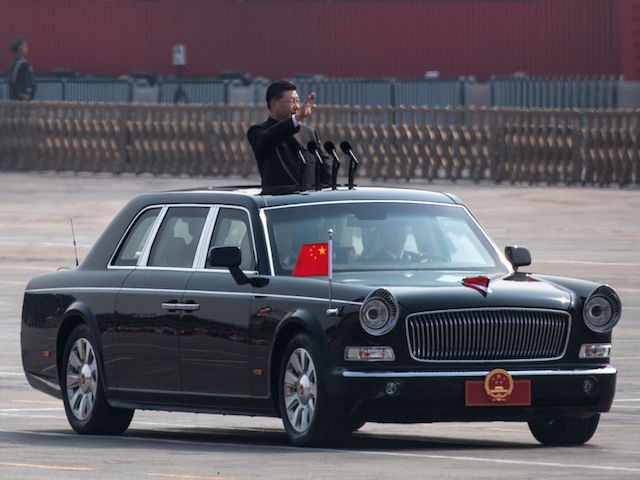
Xi Jinping waves as he drives after inspecting the troops during a parade to celebrate the 70th anniversary of the founding of the People’s Republic of China at Tiananmen Square in 1949, on October 1, 2019, in Beijing, China. (Kevin Frayer/Getty Images)
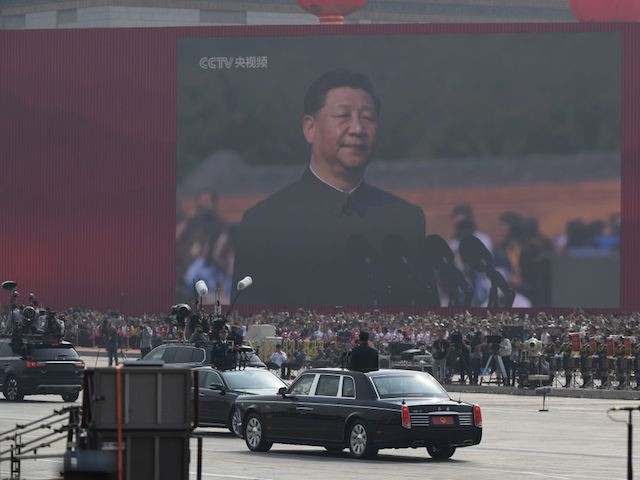
Xi Jinping begins a review of troops from a car during a military parade at Tiananmen Square in Beijing on October 1, 2019, to mark the 70th anniversary of the founding of the People’s Republic of China. (GREG BAKER/AFP)
At press time, seven of the top stories on the state news agency Xinhua’s website were about Xi personally, not only about the festivities. Propaganda in state newspapers like the People’s Daily, the official CPC publication, credited Xi with giving the Chinese people their dreams back.
“The Chinese Dream proposed by Xi resonates in the minds of hundreds of millions of Chinese people, and has become the most influential notion to date in Chinese society,” the People’s Daily claimed. “Xi has repeatedly stressed that the Chinese Dream, after all, is the dream of the people. History shows that the personal future and destiny of each individual are closely connected with the future of the country.”
The “Chinese Dream” is Xi’s alternative to the “American dream,” where instead of China being a land where individuals can achieve their own highest aspirations with enough hard work, the collective achieves Xi Jinping’s highest aspirations with enough hard work.
Xi delivered a speech in which he congratulated Chinese communists for staying in power seven decades and touted “great achievements” — without mentioning the mass murder of his predecessors, most egregiously the killing of 45 million people, most via starvation, during Mao Zedong’s Great Leap Forward in the late 1950s and early 1960s. Xi notably gave Mao a minimal role in the celebrations; images of Xi featured much more prominently and even Deng Xiaoping, Mao’s predecessor who enabled China to expand its communist influence worldwide, received more mentions.
“Right at this moment, Chinese people of all ethnic groups and all the sons and daughters of the Chinese nation at home and abroad take pride in and give our best wishes to our great motherland with great joy,” Xi told his audience, claiming that the adoption of communism marked “the end of more than 100 years of humiliation and misery the country had suffered since modern times.”
“Today, a socialist China is standing the midst of the world and there is no force that can shake the foundation of this great nation,” he said.
Xi also threatened Hong Kong and Taiwan, insisting that “the complete reunification of the motherland” was “inevitable” and that Hong Kong could only “prosper and progress alongside the mainland.”
“We must uphold the principles of ‘Peaceful Reunification’ and ‘One Country, Two Systems,’ maintain lasting prosperity and stability in Hong Kong and Macao, promote the peaceful development of cross-Strait relations, united all Chinese sons and daughters, and continue to strive for the motherland’s complete reunification,” Xi said.
Under Xi, China has expanded its lead in the race to be the world’s worst human rights violator. China currently operates thousands of concentration camps holding between one to three million people, according to the Pentagon, most of them members of Muslim ethnic minorities. China routinely harvests the organs of political prisoners while alive and without anesthesia, according to multiple in-depth investigations on China’s organ trade. Human rights abuses against minorities under Xi have reached “historic proportions,” Secretary of State Mike Pompeo said in April.
Aside from worshipping Xi’s image, the parade featured classic 20th-century communist imagery, including plenty of hammer-and-sickle flags, floats with Soviet-era workers’ statues, and marchers in tan suits holding up flames. The parade also included acrobats in robot costumes, mobile rocket launchers, fighter jet configurations, and the new DF-5B intercontinental ballistic missile.
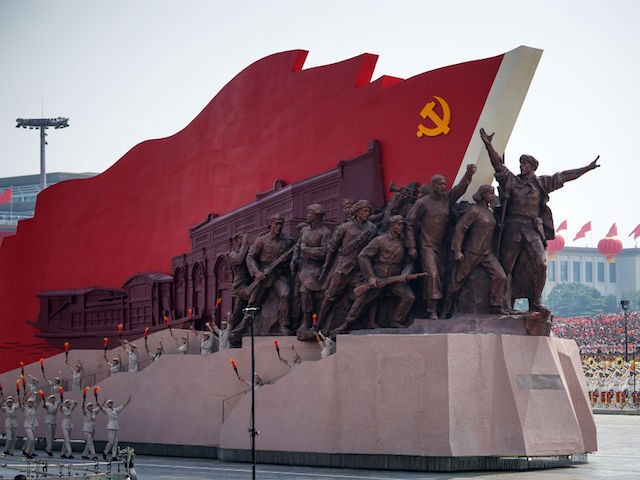
A float featuring the hammer and sickle is seen during a parade to celebrate the 70th anniversary of the founding of the People’s Republic of China in 1949, at Tiananmen Square on October 1, 2019, in Beijing, China. (Andrea Verdelli/Getty Images).

Chinese parade participants wearing communist-style costume take part in a parade to celebrate the 70th anniversary of the founding of the People’s Republic of China in 1949, at Tiananmen Square on October 1, 2019 in Beijing, China. (Kevin Frayer/Getty Images)
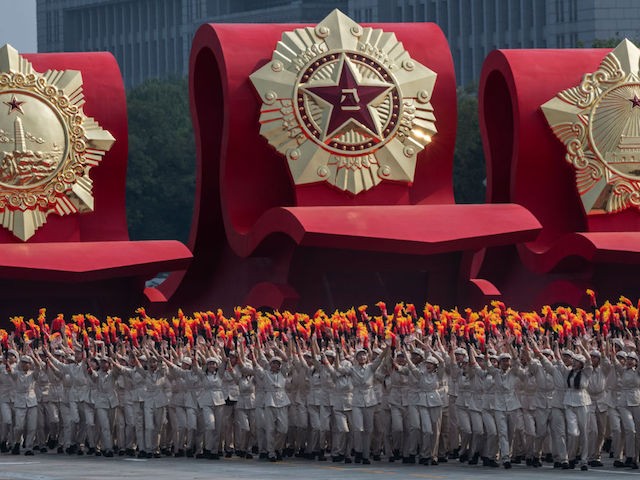
Chinese parade participants wearing communist-style costume take part in a parade to celebrate the 70th anniversary of the founding of the People’s Republic of China in 1949, at Tiananmen Square on October 1, 2019 in Beijing, China. (Kevin Frayer/Getty Images)
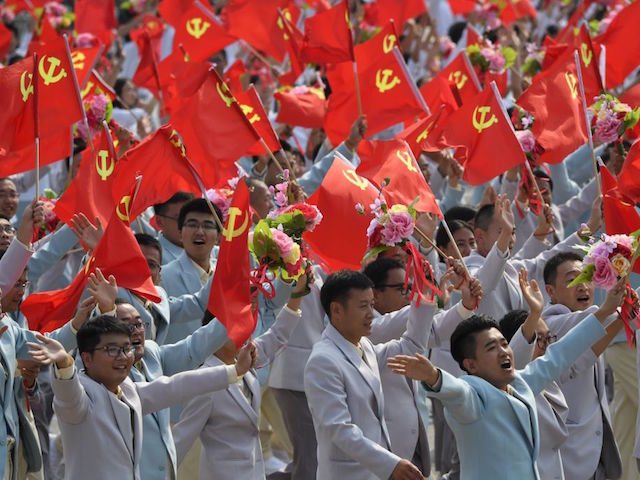
People wave Communist Party flags during a military parade in Tiananmen Square in Beijing on October 1, 2019, to mark the 70th anniversary of the founding of the People’s Republic of China. (GREG BAKER/AFP)
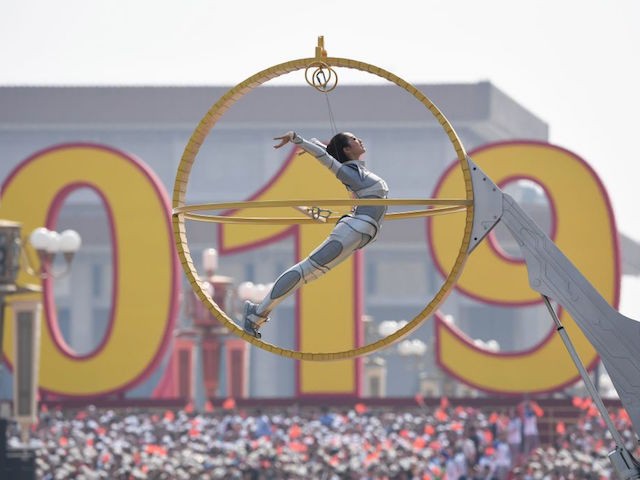
A woman performs during the National Day parade at Tiananmen Square in Beijing on October 1, 2019, to mark the 70th anniversary of the founding of the Peoples Republic of China. (GREG BAKER/AFP)
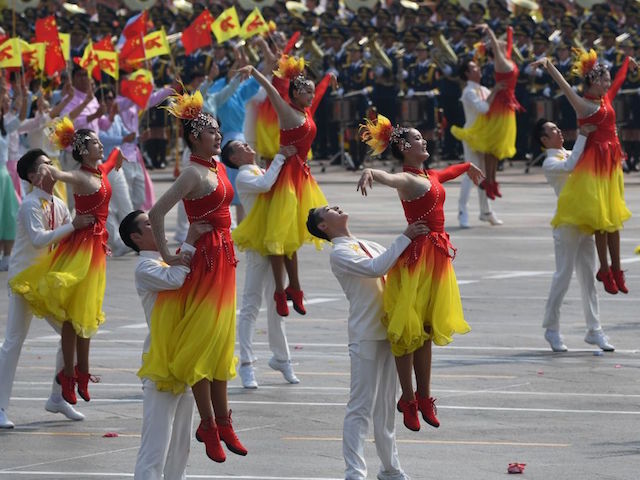
Dancers perform during a military parade and celebration in Tiananmen Square in Beijing on October 1, 2019, to mark the 70th anniversary of the founding of the People’s Republic of China. (GREG BAKER/AFP)
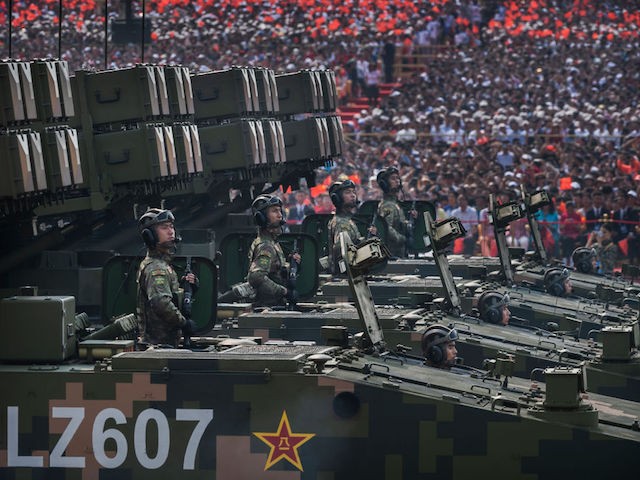
Chinese soldiers sit atop mobile rocket launchers as they drive in a parade to celebrate the 70th anniversary of the founding of the People’s Republic of China in 1949, at Tiananmen Square on October 1, 2019, in Beijing, China. (Kevin Frayer/Getty Images)
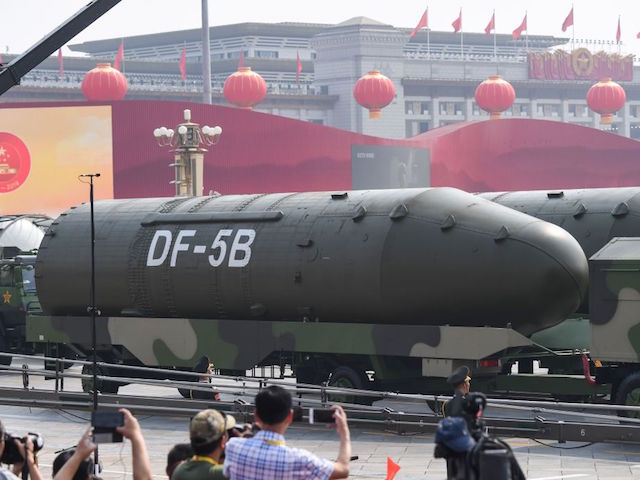
Military vehicles carrying ts participate in a military parade at Tiananmen Square in Beijing on October 1, 2019, to mark the 70th anniversary of the founding of the Peoples Republic of China. (GREG BAKER/AFP)
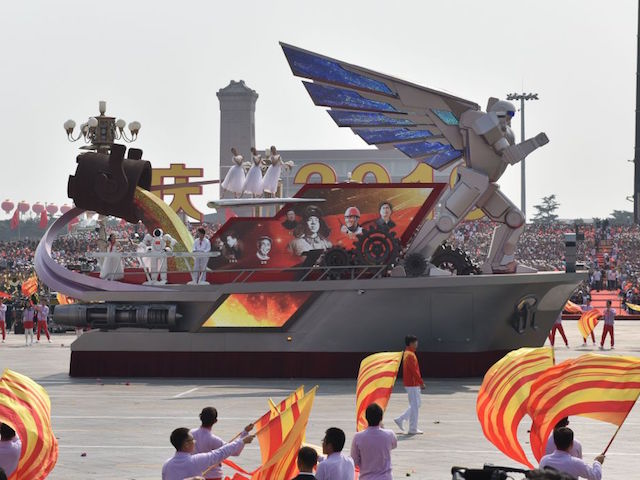
The Liaoning Province float featuring a giant winged robot passes through Tiananmen Square during a military parade in Beijing on October 1, 2019, to mark the 70th anniversary of the founding of the People’s Republic of China. (GREG BAKER/AFP)
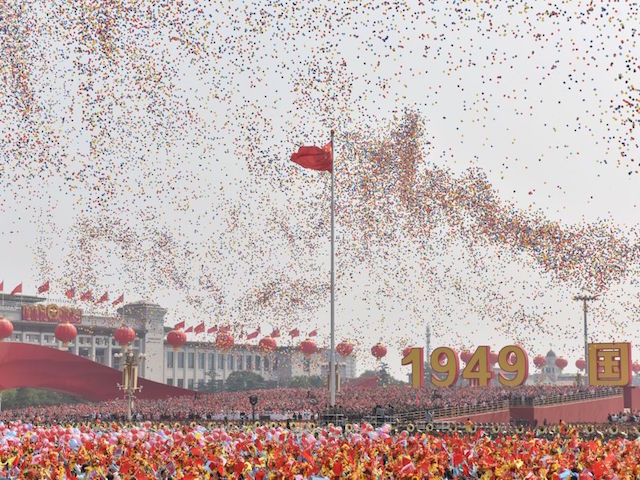
Balloons fly past the national flag at the end of a military parade at Tiananmen Square in Beijing on October 1, 2019, to mark the 70th anniversary of the founding of the People’s Republic of China. (GREG BAKER/AFP)
Several sets of troops from various wings of the People’s Liberation Army marched in lockstep, including an all-woman unit.
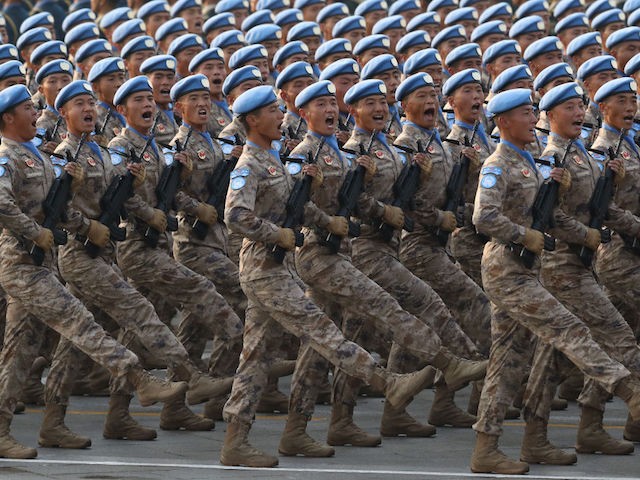
Soldiers of the People’s Liberation Army march during a parade to celebrate the 70th anniversary of the founding of the People’s Republic of China in 1949, at Tiananmen Square on October 1, 2019 in Beijing, China. (Andrea Verdelli/Getty Images)
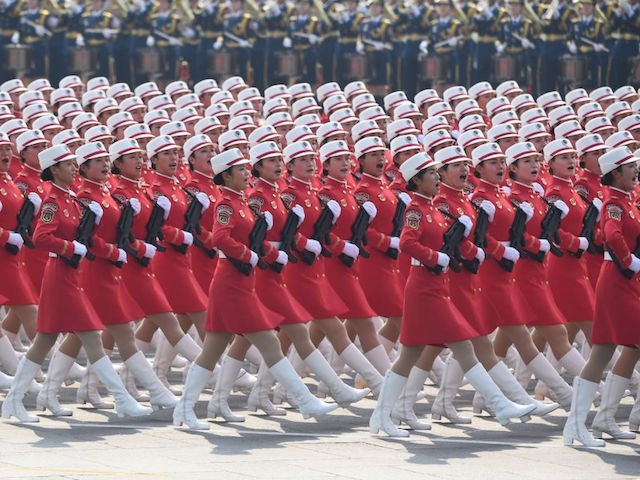
Chinese troops march during a military parade in Tiananmen Square in Beijing on October 1, 2019, to mark the 70th anniversary of the founding of the People’s Republic of China. (GREG BAKER/AFP)
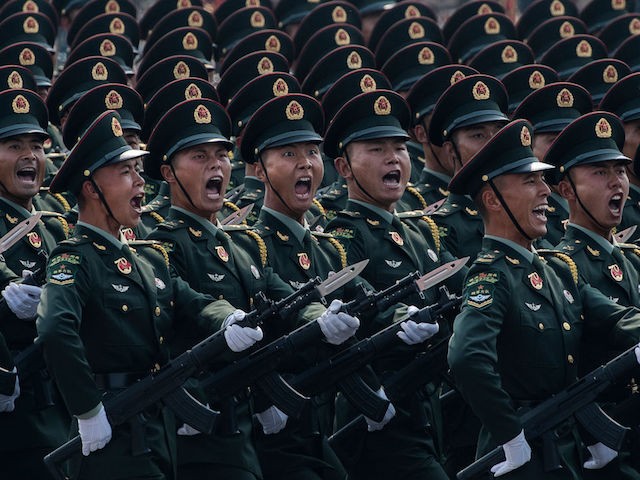
Chinese soldiers shout as they march in formation during a parade to celebrate the 70th anniversary of the founding of the People’s Republic of China at Tiananmen Square in 1949, on October 1, 2019 in Beijing, China. (Kevin Frayer/Getty Images)
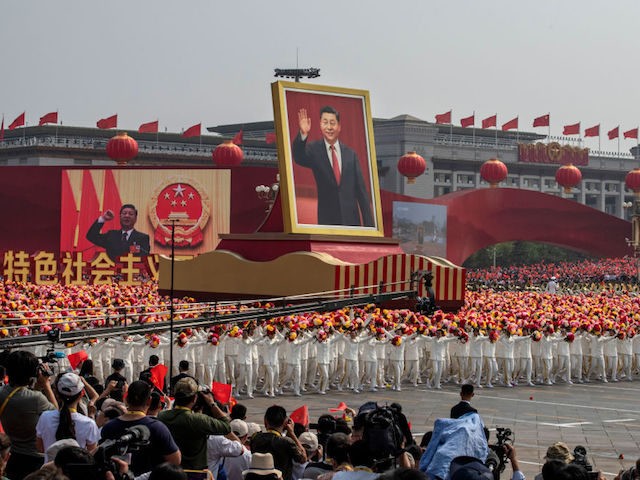
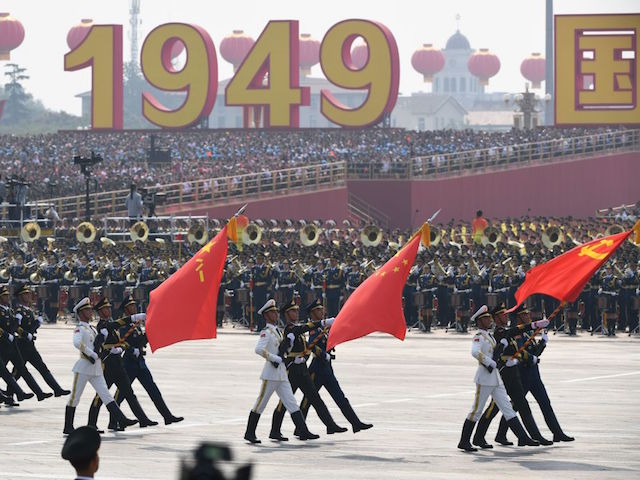
COMMENTS
Please let us know if you're having issues with commenting.